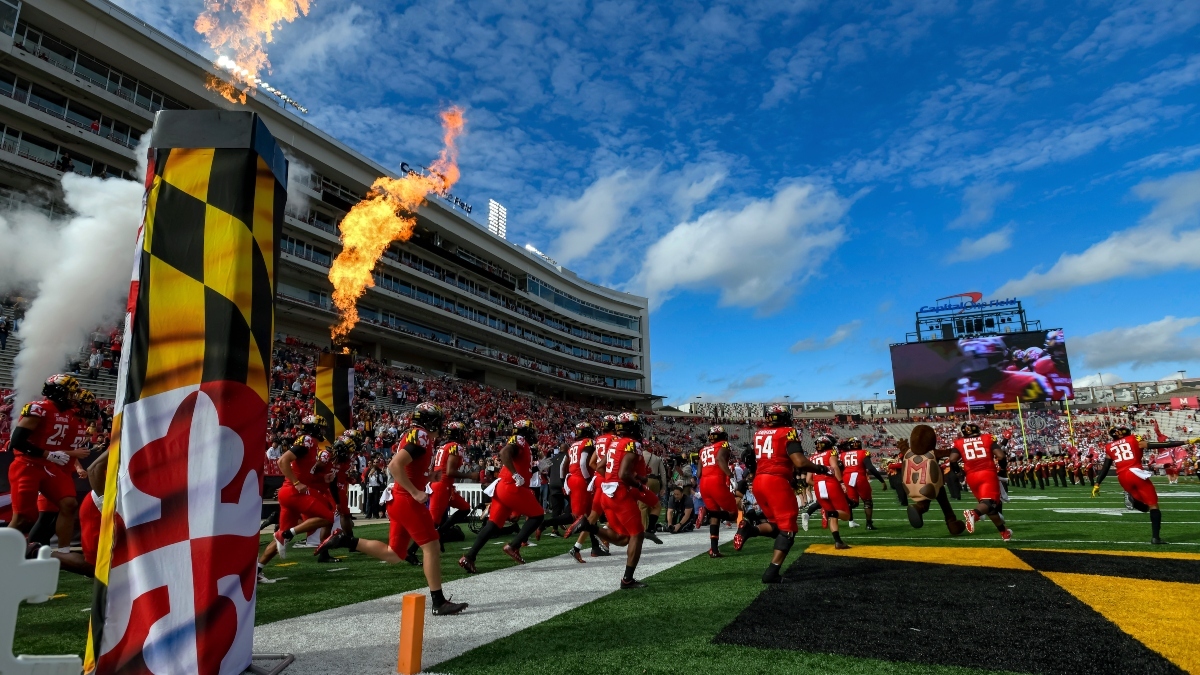Projected Betting Revenue From Maryland Online Sports Betting
Mark Goldman/Icon Sportswire via Getty Images. Pictured: The Maryland Terrapins football team at Capital One Field in College Park, MD.
Legal online sports betting is set to go live in Maryland sometime Wednesday. More than two years after Maryland officials legalized sports betting, the Old Line State is set to be the 21st state to offer legalized in-person and online sports wagering.
With legal Maryland online sports betting just around the corner, you may wonder: How much tax revenue is online sports wagering expected to generate?
Well, the numbers greatly vary depending on the source. Some projections of annual revenue have come in just under $20 million, while other unofficial estimates forecast revenue potentially closer to $100 million.
What we do know is this: the tax rate on sports betting in Maryland, which is 15%, the same as Louisiana, Illinois and Virginia, and similar to the 13% and 13.75% tax rates on online sports betting in New Jersey and Connecticut, respectively.
Potential Maryland Sports Betting Revenue
States that legalize online betting generally have a great turnout in the first couple of months after launch. New York, for example, generated $70 million in tax revenue in their first month of going live earlier this year.
Maryland has missed out on millions of potential tax revenue due because of the two-year delay since it officially legalized sports betting. While in-person betting has been live since last December, Maryland's ramp-up to go live has been the longest waiting period for an online sports betting launch in history.
Since retail sportsbooks launched in December 2021, $3 million in tax revenue has been generated, but online wagering could bring in $30million in 2023, according to the Maryland Lottery.
Where Will the Sports Betting Revenue Go?
The vast majority of fees and taxes generated from sports betting revenue in Maryland, including all of the taxes on revenue from actual betting, will go to the Maryland Department of Education’s Blueprint for Maryland’s Future Fund.
Additionally, an appropriation of $1.5 million must go to Bowie State University and Morgan State University to establish centers at each school for the study of data analytics and sports gaming.
There is also a stipulation in Maryland's legal sports betting bill that SMWOBSWA (Small, Minority-Owned, and Women-Owned Business Sports Wagering Assistance) Fund won’t receive additional tax revenue from day-to-day operations, but instead from the granting of each license to a sportsbook in Maryland. Maryland's State Lottery and Gaming Control Agency will collect $4.9 million from those same sportsbook licensing fees. That revenue is earmarked for the Fiscal Year 2022.
Background on Maryland Sports Betting
The Old Line State legalized sports betting two years ago in November 2020.
Maryland is the 18th most-populous state and is home to almost 6.3 million people. Maryland is also expected to see an influx of betters from Washington D.C., which is home to over 700,000 people.
There are a couple of bordering states that have legalized sports betting — Pennsylvania, Virginia, West Virginia, and Delaware (in-person betting only).
Massachusetts, Maine, and Vermont are the only northeastern states that have yet to legalize sports betting, but Massachusetts is expected to go live with betting in early 2023.
After Maryland online sports betting launches, Ohio is next in line to go live with legal retail and online sports betting on Jan. 1.
How would you rate this article?
